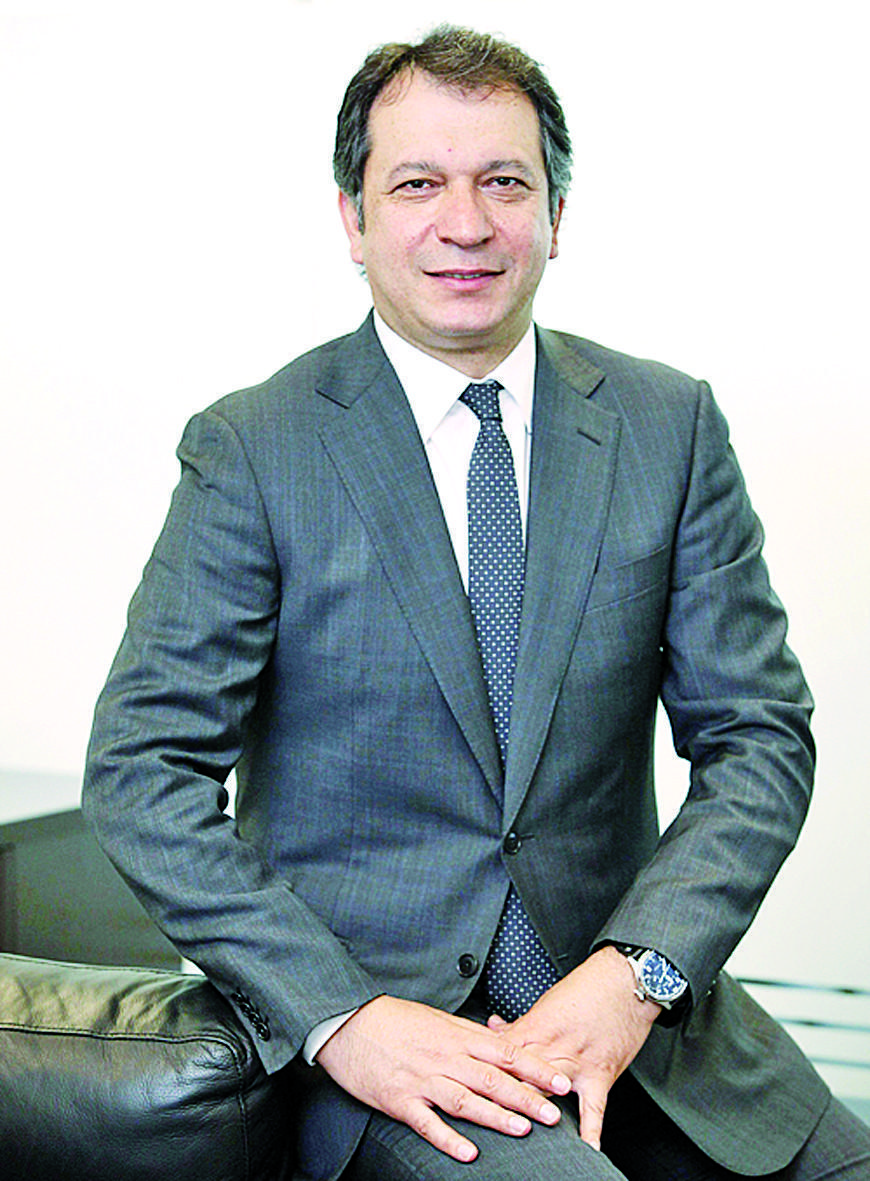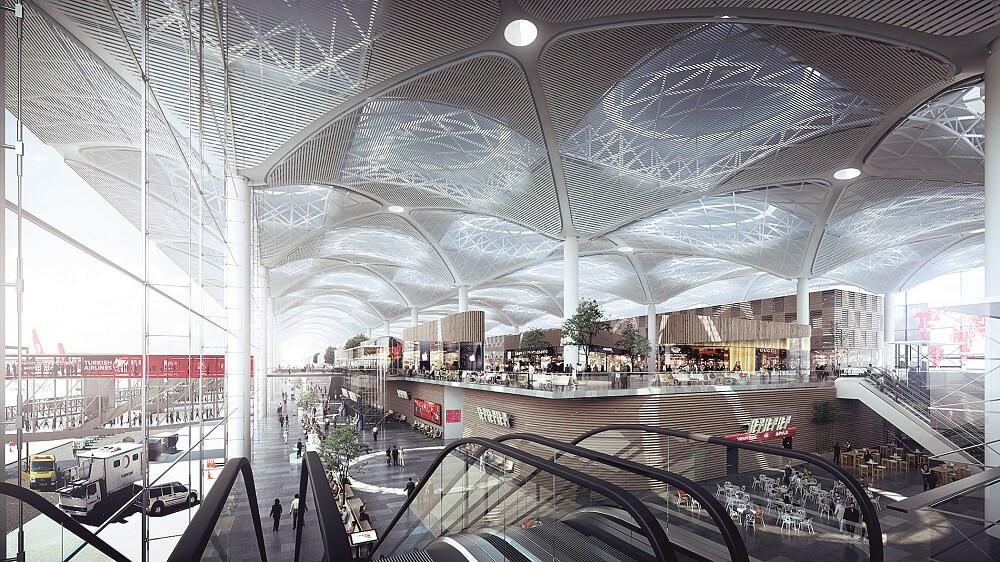Construction of new Istanbul airport officially starts under shadow of challenges, questions
Güneş Kömürcüler - ISTANBUL

İGA CEO Yusuf Akçayoğlu (inset) says some 1,300 trucks are conducting excavation works and the company’s aim is to increase this number to 2,000 soon. Around 700,000 cubic meters of soil are drilled and transported every day, set to increase to 1 million.
The construction of Istanbul’s new airport officially started on May 1, 2015, after the General Directorate of State Airports Authority (DHMİ) officially handed over the allocated area, said the chief of the Istanbul Grand Airport company (İGA) established to build the airport, challenging what he described as a “public misunderstanding.”

“There is a misunderstanding in the public that we started the construction earlier than this date. But the land was officially submitted by the DHMİ to us as of May 1 this year and we have only just started our construction activities,” İGA CEO Yusuf Akçayoğlu told the Hürriyet Daily News.
The planned airport is one of Turkey’s most controversial projects in recent times for a number of reasons, from problems with the area’s soil to the airport’s potential environmental impact, as it is located in the Northern Forest Area, which experts say is of huge importance for Istanbul’s ecological sustainability.
The Cengiz-Kolin-Limak-Mapa-Kalyon Consortium, a joint venture of Turkish companies, won a tender for the third Istanbul airport in May 2013, promising to pay the state 22.1 billion euros, plus taxes, over 25 years starting in 2017.
Land much more challenging than earlier thoughtAkçayoğlu described the land upon which the airport is being built as “more challenging than earlier thought” due to the rapid tender process.
“We made a number of excavations and drilling works at the site over the last two years, so some reports claimed that we had already started the construction. Maybe we were unable to correct this perception. The tender was held rapidly as the project is of great importance for Turkey’s future. Seventy-nine million square meters of land were found for the project before the tender date. The bidding companies, however, needed to prepare their proposals upon just 25 pre-drillings. After our consortium won the tender, we saw that the land was much more challenging than we had earlier thought. So we have made more than 3,000 test drillings on the site in the two years since the tender,” he said.
What’s more, construction should still not be started yet due to labor safety concerns, as there is still an open public road near the huge construction area, Akçayoğlu added.
“The ideal working conditions have actually not yet been reached, but we are taking all measures to continue our works. There is public road just next to the construction site, in which hundreds of trucks and other construction vehicles are moving around every day. The moving of this road to somewhere else will take around a year-and-a-half. We apply maximum labor safety standards to avoid any accidents,” he said.
Akçayoğlu said a total of 6,086 people are working at the site, including 400 administrative officials.
Most of the construction site was previously used as a mining area and there are many deep water-filled holes, complicating the construction process.
Akçayoğlu said 1,300 trucks are conducting excavation works and the company’s aim is to increase this number to 2,000 soon. Around 700,000 cubic meters of soil are drilled and transported every day, set to increase to 1 million.
Reports have claimed that there is no empty space left in Istanbul to unload such a large amount of excavated soil, but the İGA head said it would be used at the airport site.
“We will use all soil at our construction site. There are 64 water deposits opened by miners years ago ... We have emptied these holes of the water and are now filling them with the excavated soil,” said Akçayoğlu, stressing that these water-filled holes are not “natural lakes” as reported.
The potential environmental effects of Turkey’s “mega projects” are among their most controversial aspects, and this is no different for Istanbul’s new airport. The Environmental Impact Report (ÇED) report claimed that the area for the project is 7,650 hectares in total, 6,173 hectares of which is forested land. It also stated that 1,180 hectares are open to mining and other such activities, while 660 hectares are lakes, 236 hectares are pastoral land, 60 hectares are agricultural land and two hectares are marshland.
“These water deposits are not natural lakes, as the water in these deposits does not have a connection with the underground water deposits. These are just water filled holes opened by miners,” Akçayoğlu said.
He also stressed that the company has vowed to plant five new trees for each tree it cuts down during the construction and has applied for an internationally recognized environmental impact report, despite not having to do so according to its contract liabilities.
“We’ll plant the trees we have promised in areas where no buildings are constructed at the site. We are also taking the endemic plantations in the area to the ecological preservation institutions, such as the Atatürk Arboretum in Istanbul. Some of the seeds of the endemic plants have also been sent to the Seed Bank in Ankara,” he said.
Company’s environmental promisesAccording to İGA, a total of 10,000,000 trees will be planted, while around 20,000 young trees have been replanted in schools in two districts of Istanbul so far. Two endemic plant types have been registered up to now, while 115,000 corms have been carried from the construction site to be preserved, said the company, while the preserved plant types will be used in the airport’s landscaping works.
An environmental impact analysis has been prepared by the U.K.-based Environ over the last two years, showing that there are a total of 4,350 hectares of forested land at the site, 2,700 hectares of which are made up of natural forests, in line with the definition of the United Nations Framework Convention on Climate Change (UNFCCC), said the company.
The Environ report also confirmed that the water deposits were formed during mining activities after the 1990s and these deposits have no connection to Istanbul’s underground water supplies. The company also said the weather quality modeling of the airport had been conducted and the projected effect of the airport was found to be very low upon two scenarios for 2022 and 2042.
The report also revealed, however, that the construction site is on birds species’ migration routes. In response, Akçayoğlu said the company has put together a team to record the bird types migrating over the construction site and the “required systems are being established to overcome the negative effects on bird migrations.”
“We also measured the wind circles in the area with representatives from international and local civil aviation authorities. After all measurements, I can say the third airport has the same flight safety standards as the [Istanbul] Atatürk Airport,” he said.
Phase A of the first stage of the project must be completed within 42 months, he added.
“We’ll finish some works earlier than this date and plan to open two landing fields and one terminal in the first quarter of 2018 to serve 90 million passengers ... Sixteen months after this date we need to open the third landing fields,” Akçayoğlu said.
He added that among the most challenging things for the construction was the fact that they could work for only 210 days per year due to Istanbul’s weather conditions.
As for funding, the company is using a bridge loan and plans to finalize ongoing loan negotiations with several banks and the DHMİ by the end of July or the beginning of August.
What will happen to Atatürk Airport?The new airport will serve a total of 150 million passengers and over 150 airline companies, employing 100,000 people when it is completed, Akçayoğlu said, adding that it will host flights to nearly 400 destinations. The airport is expected to become one of the biggest in the world and the biggest air transfer hub in Europe.
Among the lingering questions centers around what will happen to the Istanbul Atatürk Airport once the third airport is opened. The İGA CEO confirmed that it would be closed down.
“According to our build-operate-transfer contract, Atatürk Airport needs to be closed down. But I don’t know how the site will be used ... Atatürk Airport now does a great job serving millions of passengers. The number of passengers, however, far exceeds the airport’s capacity. If the passenger number had remained the same, its capacity would have been enough. But that is not the case,” he added.

 “There is a misunderstanding in the public that we started the construction earlier than this date. But the land was officially submitted by the DHMİ to us as of May 1 this year and we have only just started our construction activities,” İGA CEO Yusuf Akçayoğlu told the Hürriyet Daily News.
“There is a misunderstanding in the public that we started the construction earlier than this date. But the land was officially submitted by the DHMİ to us as of May 1 this year and we have only just started our construction activities,” İGA CEO Yusuf Akçayoğlu told the Hürriyet Daily News.